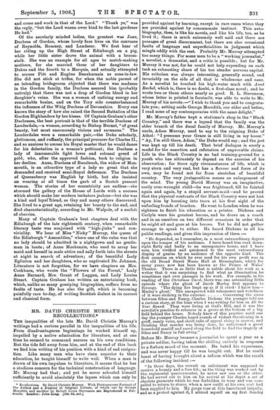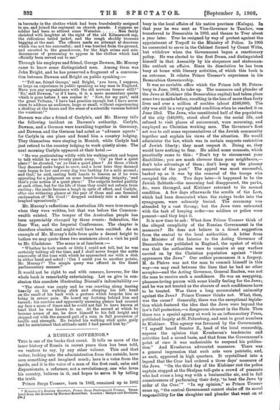MR. DAVID CHRISTIE MURRAY'S RECOLLECTIONS.*
THE inequalities of the late Mr. David Christie Murray's writings had a curious parallel in the inequalities of his life. From disadvantageous beginnings he worked himself up, impelled by a native admiration for literature, and at one time he seemed to command success on his own conditions. But the tide fell away from him, and at the end of this book we find him writing of his position with a kind of sad resigna- tion. Like many men who have risen superior to their education, he taught himself to write well. When a man is drawn of his own impulses to literature, it means that he has a studious concern for the technical construction of language. Mr. Murray had that; and yet he never schooled himself sufficiently to avoid absolutely the lapses which can only be • Recollections. By David Christie Murray. With Photogravure Portrait of the Author and a Number of Original Letters, of which one by George Meredith and another by Robert Louis Stevenson are Reproduced in Fac- simile. London : John Long. [10n 6d• net.]
provided against by learning, except in rare cases where they are provided against by consummate instinct. This auto- biography, then, is like his novels, and like his life, too, as he lived it ; there is much extremely well said and there are passages of great discernment, but there are also occasional faults of language and superficialities in judgment which mingle oddly with the rest. Probably Mr. Murray attempted too many things. For some men to be a " working journalist," a novelist, a dramatist, and a critic is possible ; but for Mr. Murray it was not, for he could not help expending on each task an exhausting share of his too slender nervous capital. His criticism was always interesting, generally sound, and invariably on the side of all that is wholesome and sane. As a novelist he touched his high-water mark with Aunt Rachel, which is, there is no doubt, a first-class novel ; and he wrote two or three others nearly as good. R. L. Stevenson, whose letter is printed in facsimile, was able to write to Mr.
Murray of his novels :—" I wish to thank you and to congratu- late you; setting aside George Meredith, our elder and better, I read none of my contemporaries with the same delight" Mr. Murray's father kept a stationer's shop in the "Black Country," and there was a legend that the family was the older branch of the ducal family of Murray. Mr. Murray's uncle, Adam Murray, used to say to the reigning Duke of Athol: "I presume your Grace is still living in my hoose." " Ay, I'm still there, Adam," the Duke would say ; and the jest was kept up till his death. That brief dialogue is surely a model for the assertion and refutation of unprovable claims.
Life in the Black Country is no bad training-ground for a youth who has ultimately to depend on the exercise of his observation ; for there ugly circumstances of life, which is very stern and very real, but has a flavour and force of its own, may be found not far from stretches of beautiful country. The very juxtaposition means an enlargement of the mind. The young David Murray was an imaginative, easily over-wrought child—he was frightened, till he fainted again and again, by a stupid servant-maid—and he proved that the physical contrasts of the Black Country were not lost upon him by bursting into tears at his first sight of the unfurling fronds of bracken. He went to London when he was eighteen to finish his education as a printer. Dickens and Carlyle were his greatest heroes, and he drove on a coach and in an omnibus on two different occasions in order that he might sit and gaze at his heroes. Yet he did not gather courage to speak to either. He heard Dickens in all his public readings, and gives this impression of them :—
" He depended, as I remember, in a most extraordinary degree upon the temper of his audience. I have heard him read down- right flatly and badly to an unresponsive house, and I have seen him vivified and quickened to the most extraordinary display of genius by an audience of the opposite kind. The first occasion on which he ever read for his own profit was in the old Broad Street Music Hall at Birmingham, which for many years now has been known as the Prince of Wales Theatre. There is so little that is subtle about his work as a writer that it was surprising to find what an illumination he sometimes cast over passages in his work. For example, in his reading of the Christmas Carol, there was one astonishing little episode where the ghost of Jacob Marley first appears to Scrooge. `The dying fire leapt up as if it cried : I know him- Marley's ghost.' The unexpected wild vehemence and weirdness of it were striking in the extreme Concerning the scene between Sikes and Nancy, Charles Dickens the younger told me a curious story, at the time when I was writing for him on All the Year Round. They were living at Gad's Hill, and it was the novelist's practice to rehearse in a grove at the bottom of a big field behind the house. Nobody knew of this practice until one day the younger Charles heard sounds of violent threatening in a gruff, manly voice, and shrill calls of appeal rising in answer, and thinking that murder was being done, ho unfastened a great household mastiff and raced along the field to find the tragedy of Sikes and Nancy in full swing."
Before Mr. Murray became a journalist he spent a year as a private soldier, having taken the shilling entirely in response to a forlorn mood of the moment. He hated his experience,
and was never happy till he was bought out. But he could boast of having brought about a reform which was the result of the following incident :—
"In those days, the recruit on enlistment was supposed to receive a bounty and a free kit ; as the thing was worked out by the regimental quartermaster, he never saw one or the other. He had served out to him on his arrival at his depot a set of obsolete garments which he was forbidden to wear and was com- pelled to return to stores, when a new outfit at his own cost had been supplied to him. My gorge rose at this bare-faced iniquity, and as a protest against it, I attired myself on my first Sunday in barracks in the clothes which had been fraudulently assigned to me, and joined the regiment on church parade. I suppose no
soldier had been so attired since Waterloo Men fairly shrieked with laughter at the sight of the old Kilmarnock cap, the ridiculous tailed jacket, and the rough shoddy trousers bagging at the seat. The officers made an attempt at decorum which was not too successful; and I was hustled from the ground, and escorted to the guard-room, for the high crime and mis- demeanour of presuming to appear in the clothes which had officially been served out to me."
Through his employer and friend, George Dawson, Mr. Murray came to know some distinguished men. Among them was John Bright, and he has preserved a fragment of a conversa- tion between Dawson and Bright on public speaking :— "'Tell me, friend George,' said Bright, you have, I suppose, as large an experience in public speaking as any man in England. Have you any acquaintance with the old nervous tremor still ? ' 'No,' said Dawson, or if I have, it is a mere momentary qualm which is gone before I can realise it." Now, for my part,' said the great Tribune, I have had practice enough but I have never risen to address an audience, large or small, without experiencing a shaking at the knees and the sense of a scientific vacuum behind the waistcoat.'"
Dawson was also a friend of Carlyle's, and Mr. Murray tells the following incident on Dawson's authority. Carlyle, Dawson, and a German were travelling together in Germany, and Dawson and the German had acted as "advance agents" for Carlyle in one place and found him a country lodging. They themselves were staying in. Munich, while Carlyle had just retired to the country lodging to work quietly alone. The next morning Carlyle appeared at their hotel :—
" He was gesticulating wildly with his walking-stick and began to talk whilst he was twenty yards away. 'Ca' ye that a quiet place ?' he shouted, ca' ye that a quiet place ? At three o'clock they damned cocks began to crow, and a hour later they damned oxen began to low and every dog was barking for a mile around; and that,' he said, casting both hands to heaven as if he were appealing for a judgment on some heart-breaking iniquity, and that's your notion of a quiet place ! ' The culprits looked guiltily at each other, but for the life of them they could not refrain from smiling; the smile became a laugh in spite of effort, and Carlyle, after one withering glance at the pair of them and one frenzied exclamation of Ma Goad ! ' dropped suddenly into a chair and laughed uproariously."
Mr. Murray's reflections on Australian life were true enough when they were written, but that was before the Common- wealth existed. The temper of the Australian people has been appreciably changed by three events: federation, the Boer War, and the Imperial Conferences. The chapter is therefore obsolete, and might well have been omitted. As an example of Mr. Murray's falls from quite a decent height to bathos we may quote these two sentences about a visit he paid to Mr. Gladstone. The scene is at luncheon :-
" Whether he took much or little I could not tell, but he was certainly talking all the time, and I shall never forget the noble sonorosity of the tone with which he approached me with a dish in either hand and asked : 'Can I assist you to another potato, Mr. Murray ?' The simple query was offered in the finest parliamentary manner."
It would not be right to end with censure, however, for the whole book is remarkably entertaining. Let us give in con- clusion this anecdote illustrating Disraeli's indomitability :— " The street was empty and he was crawling along leaning heavily on his walking stick and clasping his left hand on the small of his back with a gesture which bespoke him as being in severe pain. He heard my footstep behind him and turned; his careless and apparently unseeing glance had crossed my face a score of times and he could not fail to have known at least that he was known to me. At the second at which be became aware of me, he drew himself to his full height and stepped out with the assured gait of a man in full possession of health and strength. He twirled his walking stick quite gaily and he maintained that attitude until I had passed him by."







































 Previous page
Previous page